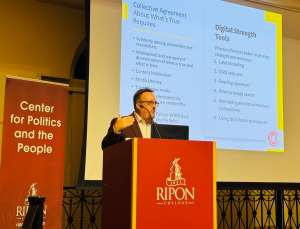2025

On October 23rd, Mike Wagner gave a lecture at the Center for Politics and the People at Ripon College, “The Misinformation Machine: Who Makes It, Who Buys It, and How to Stop It.” You can watch it on Wisconsin Eye. https://wiseye.org/2025/10/23/ripon-college-cpp-the-misinformation-machine-who-builds-it-who-buys-it-and-how-to-stop-it/
SJMC Ph.D. alum Macau Mak and Mike Wagner published, “Multi-Platform Social Media Use and Incidental Exposure: A Two-Step Analysis of the Conjoint and Distinct Roles of Network Heterogeneity and Homogeneity Across Platforms” in Social Media + Society. https://journals.sagepub.com/doi/10.1177/20563051251386721
Ph.D. Candidate Yoo Ji Suh, Michael W. Wagner and Dhavan V. Shah published “How Partisan Media Influences Aversion to Political Compromise” in Media and Communication.
CCCR Ph.D. alum Sadie Dempsey led a group of several current and former PhD students & CCCR faculty to publish “Manufacturing January 6th: How Republican County Parties Mobilized Anger to #StopTheSteal” in Politics & Society.
2024
New grant! UW-Madison’s Center for Communication and Civic Renewal Expands Groundbreaking Research on the Impact of 21st Century Communication on Civic Life, with $3 million in funding over the next five years.
CCCR Ph.D. student Yiming Wang, Ph.D. alum Porismita Borah, & Prof. Michael Wagner published “Does the Losing Side Lose the Democratic Faith? Partisan Media Flow and Democratic Values during the 2020 U.S. Presidential Election” in Political Communication.
CCCR Ph.D. student Yiming Wang led a team of grad students & faculty to publish “Slant, Extremity, and Diversity: How the Shape of News Use Explains Electoral Judgments and Confidence” in Public Opinion Quarterly.
CCCR Ph.D. student Jianing Li & Prof. Michael Wanger published “How Do Users and Journalists Express Concerns About Social Media Misinformation? A Computational Analysis” in HKS Misinformation Review.
CCCR Ph.D. alumn Xiaoya Jiang led a team of grad students and faculty to publish “Talking Past Each Other on Twitter: Thematic, Event, & Temporal Divergences in Polarized Partisan Expression on Immigration” in Political Communication.
CCCR Ph.D. student Jiyoun Suk led a CCCR team of grad students & faculty to publish “Think Global, Act Local”: How #MeToo Hybridized Across Borders and Platforms for Contextual Relevance.” in Information, Communication & Society.
CCCR Ph.D. alum Porismita Borah led a CCCR team of grad students and faculty to publish Red Media vs. Blue Media: Social Distancing and Partisan News Media Use During the COVID-19 Pandemic” in Journal of Health Communication.
Prof. Dhavan Shah led a CCCR team of grad students & faculty to publish “Building an ICCN Multimodal Classifier of Aggressive Political Debate Style: Towards a Computational Understanding of Candidate Performance Over Time.” in Communication Methods and Measures.
2023
New article published by CCCR Executive Administrative Director Nathan Kalmoe and co-author Lily Mason in Political Communication’s Forum section: “Threats as Political Communication.”
New article published in Political Communication by CCCR PhD students Xiaoya Jiang and Jisoo Kim with alum Yini Zhang and CCCR faculty Dhavan Shah and Jon Pevehouse: “Talking Past Each Other on Twitter: Thematic, Event, & Temporal Divergences in Polarized Partisan Expression on Immigration.”
Michael Wagner has been selected to join the General Social Survey’s Scientific Advisory Board for a four year term beginning in September 2023.
Dhavan Shah has been awarded a WARF Named Professorship by the UW-Madison, which he designated as the Jack M. McLeod Professor of Communication Research
Jianing Li has won the 2023 Thomas Patterson Award for Best Dissertation in Political Communication from the American Political Science Association.
Jianing Li, Jordan Foley, Omar Dumdum and Michael Wagner have won the 2022 Paper of the Year award for Mass Communication and Society for their article, “The Power of a Genre: Political News Presented as Fact-Checking Increases Accurate Belief Updating and Hostile Media Perceptions.”
Sijia Yang has won the Terry Hynes Innovative Leadership Award for 2023.
Yiming Wang and Michael Wagner were awarded an Elections Research Center grant for Ms. Wang’s dissertation project.
Dr. Nathan Kalmoe has joined the CCCR team as Executive Administrative Director.
2022
Dhavan Shah was named a Belfer Fellow by the Anti-Defamation League’s (ADL) Center for Technology and Society (CTS), along with Erik Bucy of Texas Tech University.
Jianing Li, Jo Lukito, Ellie Yang, Jiyoun Suk, Dhavan Shah, and Mike Wagner have won the top student paper award in political communication for “Framing Black Lives Matter: The Persistence of Language Cues over Identity, Context, and Media Use” at the 2022 International Communication Association conference.
Dhavan Shah, Zhongkai Sun, Erik Bucy, Sang Jung Kim, Yibing Sun, and Mengyu Li won the top paper award in Computational Methods for “Building a Multimodal Classifier of Aggressive Political Style: A Tool for Understanding Political Performance in a Populist Era” at the 2022 International Communication Association conference.
Jianing Li and Michael Wagner have won the Top Poster award from the International Communication Association’s political communication division in 2021 for “Partisanship in Context: The Asymmetric Influence of Local Newspaper Context and Selective Exposure on Political Misperceptions in the US.”
Dhavan Shah has won the B. Aubrey Fisher Mentorship Award from the International Communication Association.
Sijia Yang has won the University of Wisconsin-Madison Exceptional Service Award.
